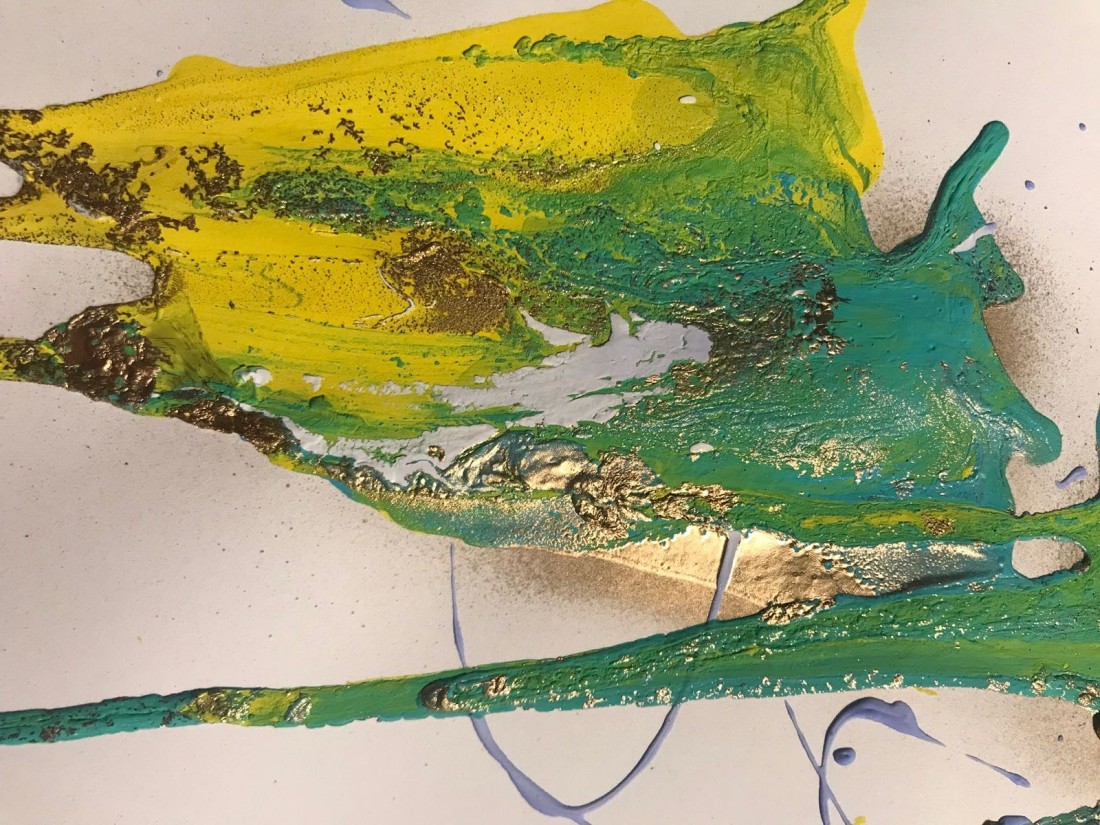
Senza titolo, Giulia Binaghi, 2017
I’ve read several posts on The Art of blogging that constantly encourage wishful bloggers to carefully take into account wishes and needs of their (potential) readers. According to these suggestions, the more a blog meets the expectations of its visitors the more is successful.
It is understandable, it is rational. And yet, I do not care. I see myself as a flower. A flower does not embellish its bloom, but opens up for what it is. He does not worry to be pleasant or to be of interest, although – I imagine – it is happy when someone becomes aware of it and appreciates it.
It could be argued that the flower – with its shape, its colors, its scent – intends to attract the attention of others. It seems reasonable and could even be true. But a flower does not strive to attract even more attention to itself by altering its scent, making its colors more vivid and / or modifying the lines of its petals or the lines of the stem on which it stands. At least, so it seems to me.
As it was born, the flower remains, following effortlessly the natural course of its evolution. The blogger who aspires to success, or more precisely to the appreciation of the greatest number of readers, instead strives to grasp what is most pleasing to them and strives to offer that in the most seducing possible way, so that (s)he can win their most unconditional fellowship.
The blogger strives to earn the appreciation of others. But even the great artist strives, even if his effort is to gain first of all the appreciation of his own severe inner judge. But if even the artist – that is, the one who probably carries out the most innate activity in the human essence – strives to create his/her artwork, does this mean that the effort is inevitably inherent in man?
To answer this question, one must ask oneself where does the effort come from, this tension to reach an ideal goal (ideal, since it is – necessarily? – set by the mind). It arises from the will, that is, from that drive to reach that state which is not yet present and to which a high value of desirability is assigned. In other words, the effort arises from a mental evaluation of reality that makes the present state less desirable than the one, only intellectually conceived at the moment, more pleasant under one or more profiles considered important. At the base of the effort is therefore an activity of the mind that succeeds in conceiving a situation better than the real, present one. The conception of a similar condition, usually, activates in us an inner tension – to which we give name of will – which acts as a propeller, providing us with the energy and the drive to act in such a way as to try to realize the ideal, more desirable, situation.
The tension therefore arises from the presumed difference of pleasantness between the present situation and that conceived by the mind; or rather, the tension arises from the natural inclination of man to prefer pleasure to pain and what is more pleasing to what is less, as well as to put on the same level the actual situation with that ideally conceived.
If these movements correctly describe the dynamics of effort, then the more a mind is lively, the greater the potential unhappiness of its “bearer”: in particular, if his/her mind is “progressive“, that is, if it is apt to imagine “better” states. By imagining continually situations better than the present one, this becomes, by comparison, increasingly sad, unhappy and unpleasant: and life as it happens becomes more and more miserable compared to increasingly numerous scenarios of ever-greater well-being.
The opposite could happen with a “regressive” mind, that is, with a mind designed to imagine scenarios worse than the present state. Such a mind, however, seems to be somewhat rare among men (assuming it actually exists). Instead there is a variant of it, called “pessimist“, which imagines that the present state must inevitably move towards the worst. In this case, the imagined state creates tension in the form of resistance to a motion considered natural. In this case the will can be defined as negative will, because it brakes instead of pushing. However, despite the opposite direction of its action, the final result generated by the will does not change: to live is to suffer, as it is a continuous, useless effort to oppose an unstoppable movement towards the worst (where, for the “positive will“, life is suffering as it constantly develops in a state which is worse than that ideally possible).
Then there is the “fatalist” mind, which imagines that there is an implicit order (see Bohm) in the reality – “hidden harmony“, called it Heraclitus – that makes perfect every present state, allowing the lucky bearer of such a mind to live in a state of lasting calm: that is, in a state of continuous absence of tension. This does not mean that a fatalistic mind can not imagine better states, and possibly even worse ones than the present state, nevertheless its conviction that the present state is the best possible at this moment (inasmuch as it corresponds to an implicit order) deprives imagined situations of every possible content of reality, making them simple abstract components of the present state. There is no tension, there is no will, there is no progressive force that pushes forward, nor conservative force that strives to hold back as much as possible the present state, hindering the becoming. With the fatalistic mind there is only a flow with the course of things, as it happens. Fate – or the implicit order of reality – has made once and for all the effort that gives rise to the becoming and there is no need to strive, because everything happens in the best possible way (even with all its pains, its sufferings and those that the mind judges as defects).
But if fate, having striven once and for all, has eliminated the effort for a fatalistic mind, how is life perceived by those who are endowed with it? Life is no longer suffering, but a discovery process. This does not mean that the bearer of a fatalistic mind does not suffer or does not feel pain, but these are just extemporaneous states of the present; they are not constant products of the continuous imagining of the mind. Such a mind does not produce suffering with its imaginative activity, but – curious and amused – observes reality, involving itself in the activity of looking for clues that can help to delineate the general features of the implicit order: that is, of the harmony that hides behind the chaotic facts of a whirlwind present, that ceases moment by moment giving way to a configuration of itself that is always new.
